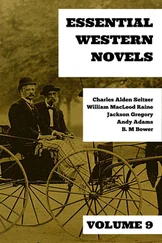William Winter - Louisiana Lou. A Western Story
Здесь есть возможность читать онлайн «William Winter - Louisiana Lou. A Western Story» — ознакомительный отрывок электронной книги совершенно бесплатно, а после прочтения отрывка купить полную версию. В некоторых случаях можно слушать аудио, скачать через торрент в формате fb2 и присутствует краткое содержание. Жанр: foreign_adventure, foreign_prose, foreign_language, на английском языке. Описание произведения, (предисловие) а так же отзывы посетителей доступны на портале библиотеки ЛибКат.
- Название:Louisiana Lou. A Western Story
- Автор:
- Жанр:
- Год:неизвестен
- ISBN:нет данных
- Рейтинг книги:5 / 5. Голосов: 1
-
Избранное:Добавить в избранное
- Отзывы:
-
Ваша оценка:
- 100
- 1
- 2
- 3
- 4
- 5
Louisiana Lou. A Western Story: краткое содержание, описание и аннотация
Предлагаем к чтению аннотацию, описание, краткое содержание или предисловие (зависит от того, что написал сам автор книги «Louisiana Lou. A Western Story»). Если вы не нашли необходимую информацию о книге — напишите в комментариях, мы постараемся отыскать её.
Louisiana Lou. A Western Story — читать онлайн ознакомительный отрывок
Ниже представлен текст книги, разбитый по страницам. Система сохранения места последней прочитанной страницы, позволяет с удобством читать онлайн бесплатно книгу «Louisiana Lou. A Western Story», без необходимости каждый раз заново искать на чём Вы остановились. Поставьте закладку, и сможете в любой момент перейти на страницу, на которой закончили чтение.
Интервал:
Закладка:
Doolittle shook his head as he rose. “At any rate,” he said, regretfully, “you may draw to whatever extent you wish and whenever you wish. And, if America should call you again, our house in New York, Doolittle, Morton & Co., will be happy to afford you every banking facility, general.”
De Launay waved his hand. “I’ll make a will and leave it in trust for charity,” he said, “with your firm as trustee. And forget the titles. I’m nobody, now, but ex-cow hand, ex-gunman, once known as Louisiana, and soon to be known no more except as a drunken souse. So long!”
He strode out of the door, swaggering a little. His képi was cocked defiantly. His legs, in the cavalry boots, showed a faint bend. He unconsciously fell into a sort of indefinable, flat, stumping gait, barely noticeable to one who had never seen it before, but recognizable, instantly, to any one who had ridden the Western range in high-heeled boots.
In some indefinable manner, with the putting off of his soldierly character, the man had instantly reverted twenty years to his youth in a roping saddle.
CHAPTER II
MORGAN LA FEE
In the hands of Doolittle, Rambaud & Cie., was a rather small deposit, as deposits went with that distinguished international banking house. It had originally amounted to about twenty thousand francs when placed with them about the beginning of the war and was in the name of Mademoiselle Solange d’Albret, whose place of nativity, as her dossier showed, was at a small hamlet not far from Biarritz, in the Basse Pyrenees, and her age some twenty-two years at the present time. Her occupation was given as gentlewoman and nurse, and her present residence an obscure street near one of the big war hospitals. The personality of Mademoiselle d’Albret was quite unknown to her bankers, as she had appeared to them very seldom and then only to add small sums to her deposit, which now amounted to about twenty-five thousand francs in all. She never drew against it.
Such a sum, in the hands of an ordinary Frenchwoman would never have remained on deposit for that length of time untouched, but, if not needed, would have been promptly invested in rentes . The unusualness of this fact, however, had not disturbed the bankers and had, in fact, been of so little importance that they had failed to notice it at all. When, therefore, a young woman dressed in a nurse’s uniform appeared at the bank and rather timidly asked to see Mr. Doolittle, giving the name of Mademoiselle d’Albret, there was some hesitancy in granting her request until a hasty glance at the state of her account confirmed the statement that she was a considerable depositor.
Mr. Doolittle, informed of her request, sighed a little, under the impression that he was about to be called upon for detailed advice and fatherly counsel in the investment of twenty-five thousand francs. He pictured to himself some thrifty, suspicious Frenchwoman with a small fortune who would give him far more trouble than any millionaire who used his bank, and whose business could and would actually be handled by one of his clerks, whom she might as well see in the first place without bothering him. As well, however, he knew that she would never consent to see anybody but himself. Somewhat wearily, but with all courtliness of manner, he had her shown into his consultation room.
Mademoiselle d’Albret entered, her nurse’s cloak draped gracefully from her shoulders, the little, nunlike cap and wimple hiding her hair, while a veil concealed her face to some extent. Through its meshes one could make out a face that seemed young and pretty, and a pair of great, dark eyes. Her figure also left nothing to be desired, and she carried herself with grace and easy dignity. Mr. Doolittle, who had an eye for female pulchritude, ceased to regret the necessity of catering to a customer’s whim and settled himself to a pleasant interview after rising to bow and offer her a chair.
“Mademoiselle has called, I presume, about an investment,” he began, ingratiatingly. “Anything that the bank can do in the way of advice – ”
“Of advice, yes, monsieur,” broke in mademoiselle, speaking in a clear, bell-like voice. “But it is not of an investment that I have need. On the contrary, the money which you have so faithfully guarded for me during the years of the war is reserved for a purpose which I fear you would fail to approve. I have come to arrange with you to transfer the account to America and to seek your assistance in getting there myself.”
The account had been profitable to the bank in the years it had lain idle there, the lady was good to look upon and, even if the account was to be lost, he felt benevolent toward her. Besides, her voice and manner were those of a lady, and natural courtesy bade him extend to her all the aid he could. Therefore he smiled acquiescence.
“The transfer of the money is a simple matter,” he stated. “A draft on our house in New York, or a letter of credit – it is all one. They will gladly serve you there as we have served you here. But if you wish to follow your money – that, I fear, is a different matter.”
“It is because it is different – and difficult – that I have ventured to intrude upon you, monsieur, and not for an idle formality. It is necessary that I get to America, to a place called Eo-dah-o – is it not? I do not know how to say it?”
“Spell it,” suggested the tactful Doolittle.
Mademoiselle spelled it, and Doolittle gave her the correct pronunciation with a charming smile which she answered.
“Ah, yes! Idaho! It is, I believe, at some distance from New York, perhaps a night and a day even on the railroad.”
“Or even more,” said Doolittle. “Mademoiselle speaks of America, and that is a large country. From New York to Idaho is as far as from Paris to Constantinople – or even farther. But I interrupt. Mademoiselle would go to Idaho, and for what purpose?”
“It is there, I fear, that the difficulty lies,” said mademoiselle with frankness. “It is necessary, I presume, that one have a purpose and make it known?”
“It is not, so far as permission to go is concerned, although the matter of a passport may be difficult to arrange. But there is the further question of passage.”
“And it is precisely there that I seek monsieur’s advice. How am I to secure passage to America?”
Doolittle was on the point of insinuating that a proper use of her charms might accomplish much in certain quarters, but there was something so calmly virginal and pure about the girl as she sat there in her half-sacred costume that instinct conquered cynicism and he refrained. Unattached and unchaperoned as she was, or appeared to be, the girl commanded respect even in Paris. Instead of answering at once he reflected.
“Do you know any one in America?” he asked.
“No one,” she replied. “I am going to find some one, but I do not even know who it is that I seek. Furthermore, I am going to bring that some one to his death if I can do so.”
She was quite calm and matter-of-fact about this statement, and therefore Mr. Doolittle was not quite so astounded as he might otherwise have been. He essayed a laugh that betrayed little real mirth.
“Mademoiselle jests, of course?”
“Mademoiselle is quite serious, I assure you, and not at all mad. I will be brief. Twenty years ago, nearly, my father was murdered in America after discovering something that would have made him wealthy. His murderer was never brought to justice, and the thing he found was lost again. We are Basques, we d’Albrets, and Basques do not forget an injury, as you may know. I am the last of his family, and it is my duty, therefore, to take measures to avenge him. After twenty years it may be difficult, and yet I shall try. I should have gone before, but the war interrupted me.”
Читать дальшеИнтервал:
Закладка:
Похожие книги на «Louisiana Lou. A Western Story»
Представляем Вашему вниманию похожие книги на «Louisiana Lou. A Western Story» списком для выбора. Мы отобрали схожую по названию и смыслу литературу в надежде предоставить читателям больше вариантов отыскать новые, интересные, ещё непрочитанные произведения.
Обсуждение, отзывы о книге «Louisiana Lou. A Western Story» и просто собственные мнения читателей. Оставьте ваши комментарии, напишите, что Вы думаете о произведении, его смысле или главных героях. Укажите что конкретно понравилось, а что нет, и почему Вы так считаете.




![Wilhelm Winter - Война по убеждениям [СИ]](/books/395832/wilhelm-winter-vojna-po-ubezhdeniyam-si-thumb.webp)







